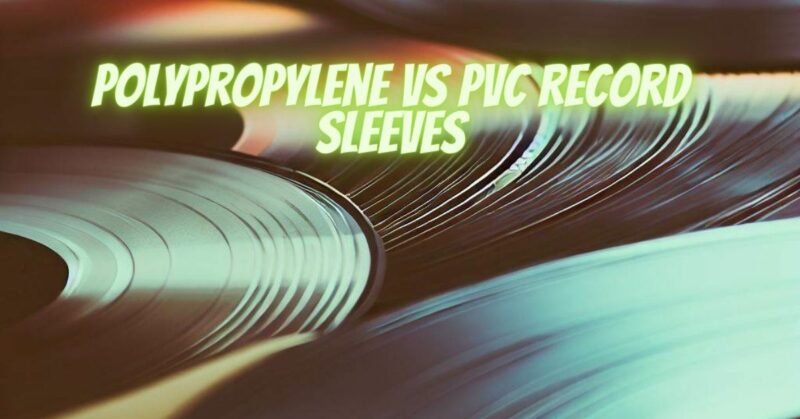Vinyl records have made a remarkable comeback in recent years, captivating audiophiles and music aficionados with their warm sound and nostalgic charm. As collectors strive to maintain and protect their precious vinyl collections, the choice of record sleeves becomes a crucial decision. Two common options in the realm of vinyl preservation are polypropylene (PP) and polyvinyl chloride (PVC) sleeves. In this article, we’ll delve into the differences between these two types of sleeves and help you make an informed decision about which is the better choice for safeguarding your beloved records.
Polypropylene Sleeves:
Polypropylene is a thermoplastic polymer that is widely used for its durability, chemical stability, and clarity. PP sleeves offer several advantages for vinyl collectors:
- Chemical Stability: Polypropylene is chemically inert, which means it doesn’t interact with vinyl records over time. This eliminates the risk of chemical reactions that could lead to vinyl degradation.
- Clarity and Transparency: PP sleeves provide excellent clarity, allowing the album cover artwork and labels to be easily seen without compromising their visibility.
- Longevity: Polypropylene sleeves are resistant to degradation, making them a durable option for long-term record storage. They do not become brittle, sticky, or discolored over time.
- Anti-Static Properties: Many polypropylene sleeves have anti-static properties that help repel dust and reduce the buildup of static electricity, which can attract dust particles.
PVC Sleeves:
Polyvinyl chloride (PVC) sleeves are another popular choice among vinyl collectors due to their affordability and protective qualities. However, they come with some potential drawbacks:
- Off-Gassing: PVC sleeves are known to emit chemical gases, which can lead to off-gassing. These gases might interact with the vinyl records and potentially cause damage, including warping or discoloration.
- Softening and Stickiness: PVC sleeves can become softer and sticky over time, causing records to adhere to the sleeve and potentially leading to surface damage during removal.
- Acid Migration: Some PVC sleeves may contain acidic additives, which can lead to acid migration when in direct contact with vinyl records. This can result in long-term vinyl degradation.
Choosing the Right Sleeve:
When deciding between polypropylene and PVC sleeves, consider the following factors:
- Longevity: If you’re looking for long-term preservation, polypropylene sleeves are the superior choice due to their chemical stability and resistance to degradation.
- Protection: Both types of sleeves offer protection from dust and moisture, but polypropylene sleeves provide added benefits of anti-static properties and no risk of off-gassing.
- Clarity: Both materials provide good clarity, allowing the album artwork to shine through. Polypropylene sleeves, however, maintain their clarity over time without the risk of becoming sticky.
- Budget: PVC sleeves are generally more affordable, which might be a consideration for collectors with large collections. However, investing in high-quality polypropylene sleeves can pay off in the long run by safeguarding your records effectively.
While both polypropylene and PVC sleeves have their merits, polypropylene emerges as the superior choice for preserving vinyl records over the long term. With its chemical stability, durability, and anti-static properties, polypropylene ensures that your records remain in excellent condition for years to come. As a vinyl enthusiast, your choice of record sleeves plays a pivotal role in maintaining the integrity and longevity of your cherished collection, allowing you to enjoy the captivating sound and visual appeal of vinyl records for generations.


